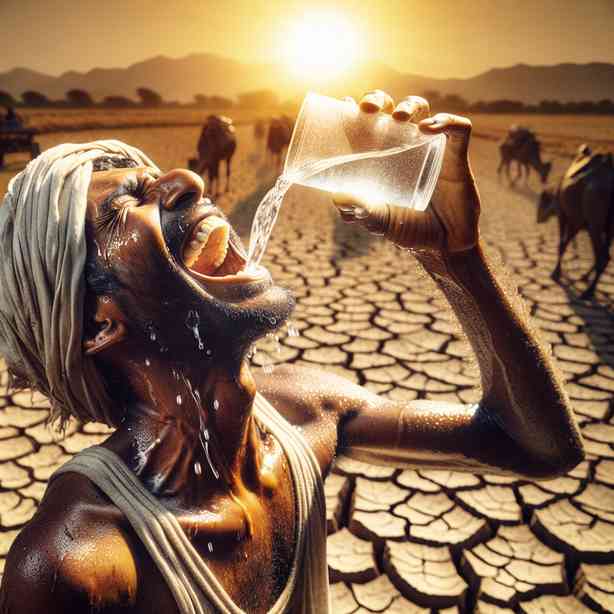
Water is often regarded as a fundamental necessity for life, but its significance extends beyond mere survival. Imagine a hot summer day when you’ve been outdoors all afternoon. After hours of physical exertion and sun exposure, the sensation of quenching your thirst with a refreshing glass of water can feel truly rewarding. This experience serves as a reminder of how vital water is to our well-being and highlights the intricate relationship between hydration and our bodily functions.
To dissect the meaning behind the phrase “when water feels like a reward,” we first need to understand our body’s physiological response to dehydration. Water makes up a significant portion of our body, with about 60% for the average adult male and around 55% for the average adult female. When we engage in physical activities, especially in the heat, we lose fluids through sweat and respiration, which leads to dehydration. This states can cause a myriad of symptoms such as fatigue, dizziness, and a decreased ability to focus. Therefore, when we finally replenish our bodies with water, it not only restores our fluid balance but also revitalizes our physical and mental states, making each sip feel like a well-earned reward.
Hydration plays a critical role in maintaining various bodily functions, from regulating body temperature to maintaining electrolyte balance. Water acts as a transport medium for nutrients and waste products, facilitating digestion and metabolism. It essentially ensures that our organs function efficiently, keeping us energized and alert. The moment we experience thirst is our body’s way of signaling that it needs replenishment. When we respond to this signal with a refreshing drink, the feeling of relief and satisfaction after a hot day or an intense workout acts as a form of reward.
Moreover, the psychological aspects of hydration are worth exploring. Our relationship with water can shape our mental state, influencing everything from our moods to our productivity levels. Specifically, when we find ourselves in a dehydrated state, it can lead to irritability and decreased cognitive function. Conversely, when we hydrate adequately, we often feel a sense of clarity and enhancement in our overall mood, contributing to a feeling of accomplishment. This positive feedback reinforces our behaviors, encouraging us to prioritize water intake not just as a necessity but as an enjoyable reward, creating a healthier lifestyle overall.
The method by which we consume water also plays a role in how rewarding it feels. For instance, drinking water from a chilled glass on a warm day can elevate the experience, transforming it into a moment of pure bliss. Additionally, flavored waters, herbal teas, or smoothies not only enhance the hydration experience but can also make it feel more indulgent. By incorporating these variations, we can perceive hydration as a form of self-care, utilizing it to reward ourselves after a long day or a workout session. Ultimately, peace and enjoyment can stem from something as simple as a drink of water, emphasizing its profound role in our lives.
On a more global scale, access to clean drinking water remains a significant concern. Many individuals around the world do not have reliable access to safe water, which can lead to dire consequences for health and well-being. This situation emphasizes the importance of appreciating the water we often take for granted. Each sip can remind us of the privileges we hold and can inspire us to help those who lack this basic necessity. Engaging in discussions around global water issues and working to ensure that everyone has access to safe drinking water can heighten our appreciation and the perceived value of water, transforming it into a symbol of hope and resilience.
To encourage one’s relationship with water as a rewarding aspect of health, there are key strategies to consider. Firstly, establishing a routine that incorporates regular water consumption could enhance overall hydration. Setting reminders to drink water throughout the day can prove beneficial, making it a consistent habit rather than an afterthought. Secondly, engaging in mindful hydration practices—like taking a moment to savor the taste of water or pause to appreciate how it impacts your body—can elevate the experience further, transforming it from a mundane task into a moment of self-reflection.
In addition to personal benefits, staying hydrated plays a crucial role in communal health. Individuals who lead by example—whether it be through personal challenges, social media engagements, or community events—can inspire others to adopt similar habits. Such initiatives can foster a collective appreciation for water, reminding us all that it’s not just a necessity but a reward in its own right. The communal aspect of hydration can proliferate into broader health campaigns that promote healthy drinking habits and raise awareness around water conservation efforts.
In conclusion, the phrase “when water feels like a reward” encapsulates both a physiological and psychological relationship that we have with hydration. It serves as a reminder of the beauty and importance of water in our everyday lives, illustrating how profoundly it affects our health, mood, and overall well-being. By recognizing the significance of this basic element, we can foster a deeper appreciation and establish our hydration routines as rewarding experiences. In doing so, we enhance not only our lives but also contribute to the broader conversation around global water access, striving for a future where everyone can enjoy the simple pleasure of a refreshing drink of water.


